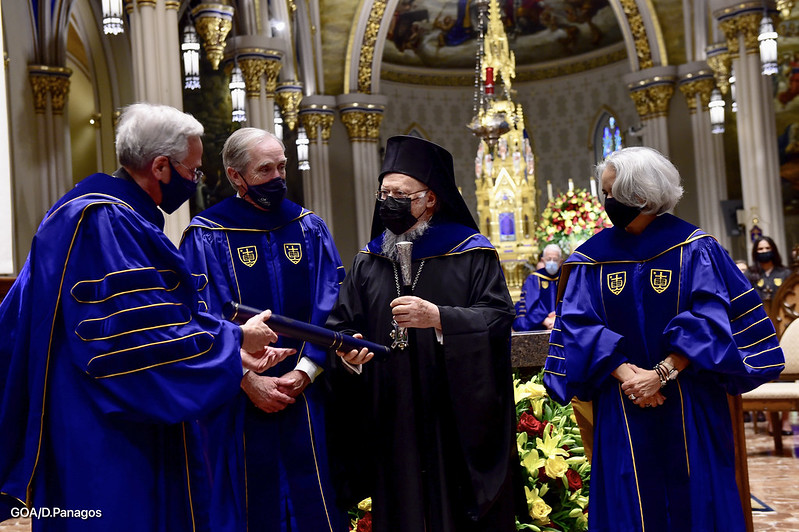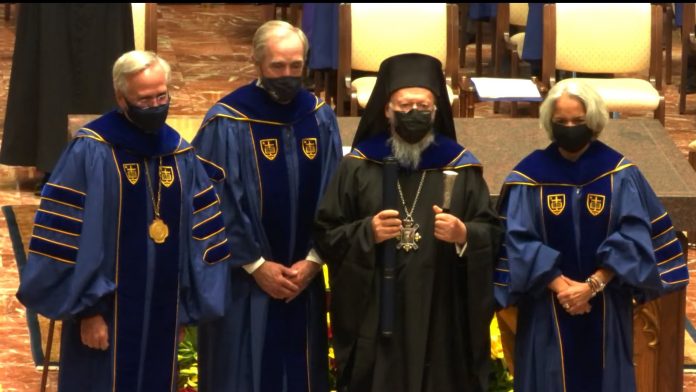Φως Φαναρίου
Η Αυτού Θειοτάτη Παναγιότης, ο Οικουμενικός Πατριάρχης, Αρχιεπίσκοπος Κωνσταντινουπόλεως και Νέας Ρώμης κ.κ. Βαρθολομαίος, ο οποίος δεν κατέστη δυνατόν να είναι ο κεντρικός ομιλητής κατά την τελετή αποφοίτησης της τάξης του 2020 στο Πανεπιστήμιο του Notre Dame, λόγω της πανδημίας του COVID-19, ήταν το τιμώμενο πρόσωπο στην πανεπιστημιούπολη του Notre Dame σήμερα, Πέμπτη 28 Οκτωβρίου 2021.
Ο Πατριάρχης αναγορεύτηκε Επίτιμος Διδάκτωρ του Πανεπιστημίου σε επίσημη ακαδημαϊκή τελετή και μίλησε για την περιβαλλοντική διαχείριση.
Σύμφωνα με τον Πρόεδρο του Πανεπιστημίου Notre Dame, Αιδεσιμώτατο John I. Jenkins, C.S.C., «ο Οικουμενικός Πατριάρχης Βαρθολομαίος είναι παγκοσμίως ένας από τους πιο διαπρεπείς και θαρραλέους θρησκευτικούς ηγέτες, και μας τιμά ιδιαίτερα το ότι θα επισκεφθεί το Notre Dame και θα λάβει τιμητικό πτυχίο. Ο πνευματικός ηγέτης των Ανατολικών Ορθόδοξων Χριστιανών σε όλον τον κόσμο, αποτελεί πηγή έμπνευσης για όλη την ανθρωπότητα, ιδιαίτερα στα θέματα περιβαλλοντολογικής ευαισθητοποίησης, υποστήριξης των προσφύγων και θρησκευτικών ελευθεριών. Το Πανεπιστήμιο Notre Dame καλωσορίζει θερμά την Αυτού Θειοτάτη Παναγιότητα του ως εν Χριστώ αδελφό».
Η τελετή έλαβε χώρα στη Βασιλική της Ιερής Καρδιάς και άμα τη εισόδω του Οικουμενικού Πατριάρχου ακούστηκε το “Τη Υπερμάχω” από εκκλησιαστικό όργανο.
Στην εκδήλωση η Βυζαντινή Χορωδία της Αρχιεπισκοπής, υπό την διεύθυνση του Γεωργίου Θεοδωρίδη, Άρχοντος Μουσικοδιδασκάλου της Ελληνικής Αρχιεπισκοπής της Αμερικής,απέδωσε βυζαντινούς ύμνους στα ελληνικά και αγγλικά.
Παραθέτουμε στη συνέχεια το βίντεο της εκδήλωσης.
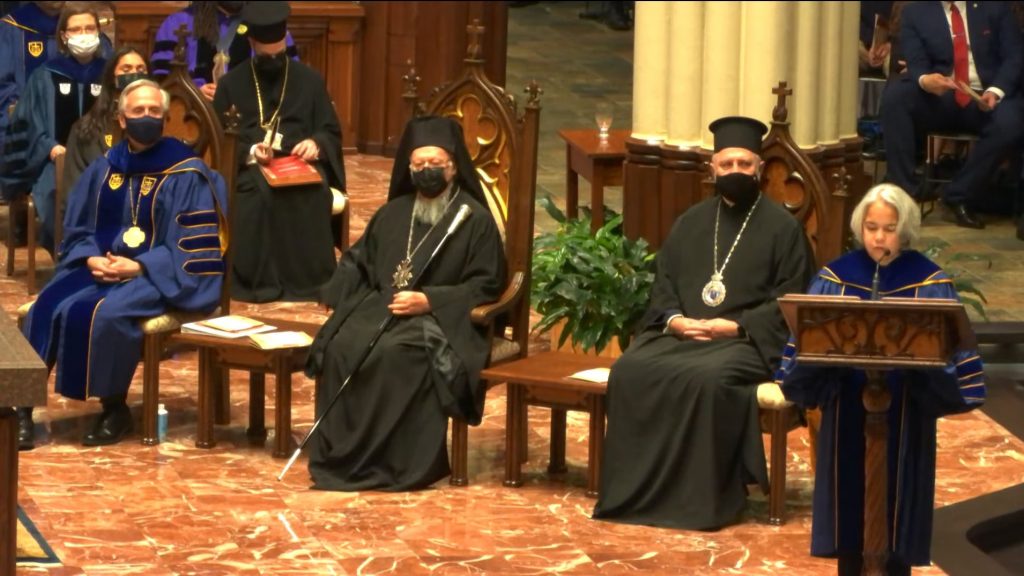
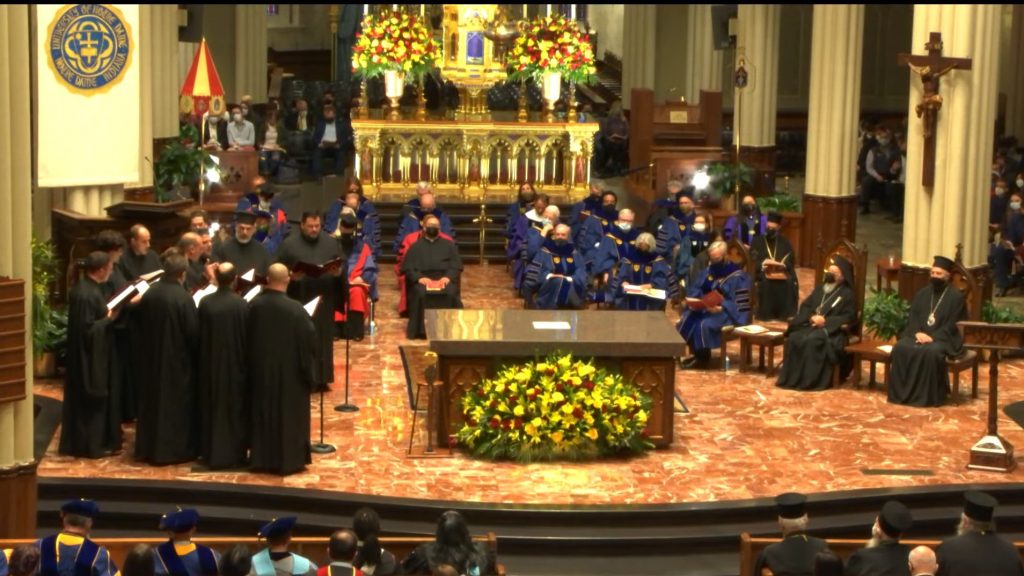
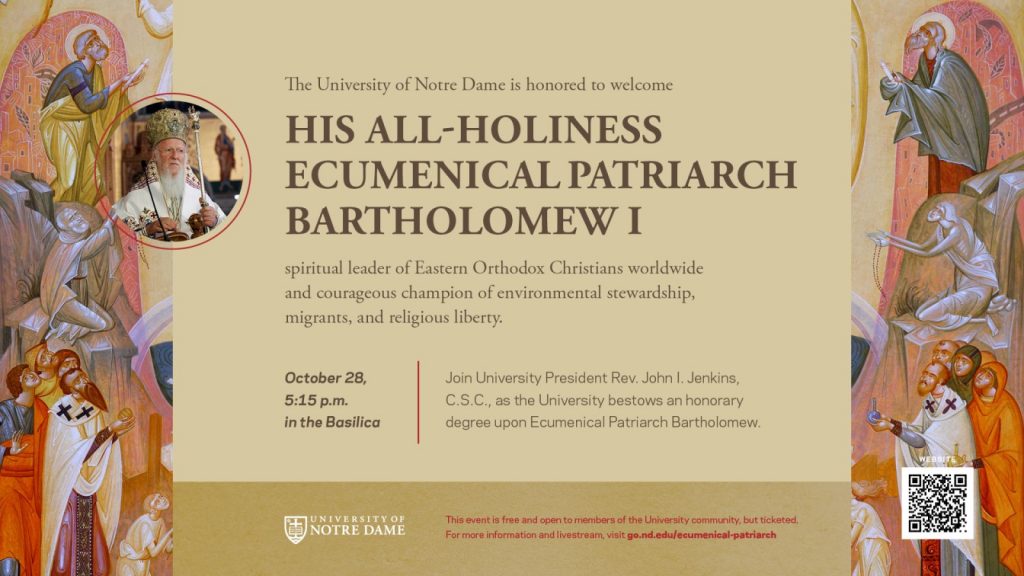
SOUTH BEND, INDIANA– His All-Holiness Ecumenical Patriarch Bartholomew received the honorary degree of Doctor of Laws from the University of Notre Dame today, October 28th, 2021, at an academic convocation held on campus at the Basilica of the Sacred Heart. His All-Holiness also delivered an address on environmental stewardship, noting that “Religion must function and serve in connection with – and never in isolation from – science.”
CLIMATE CHANGE An Ecumenical Imperative (University of Notre Dame)
His All-Holiness Ecumenical Patriarch Bartholomew
Esteemed President, Fr. John Jenkins,
Venerable hierarchs and clergy,
Distinguished faculty and guests,
Beloved students,
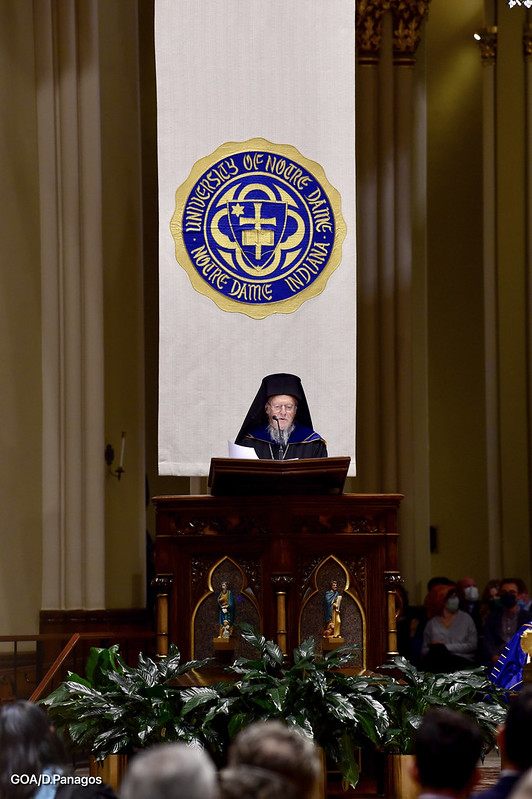
It is a unique privilege to stand before this assembly of university staff and students, as well as visitors from the region and all over the United States, in order to receive the preeminent honorary award of Doctor of Laws of the University of Notre Dame for the initiatives of the Ecumenical Patriarchate in response to the foremost challenge of our time, climate change.
We are especially honored that such a commendation comes from an academic institution with demonstrated climate and energy research, with sustained environmental and social programs, as well as with passionate student involvement and commitment. All of these have resulted in a comprehensive plan by the school’s administration to reduce your school’s carbon footprint by half within the present decade. Even the overarching theme of your scholastic year is focused on the global climate crisis. We therefore take pride in congratulating you on these admirable efforts.
However, this convocation occurs in the context of yet another global challenge. Both climate change and the coronavirus pandemic are rightly labelled as crises. You may be aware that the etymological root of the word “crisis” (κρίσις) is a Greek word that signifies “judgment.” The truth is that we are all judged by our response to or rejection of defining moments in our lives. Ironically, the strategies used to dismiss climate change and Covid-19 adhere to a similar pattern and are adopted by the same people.
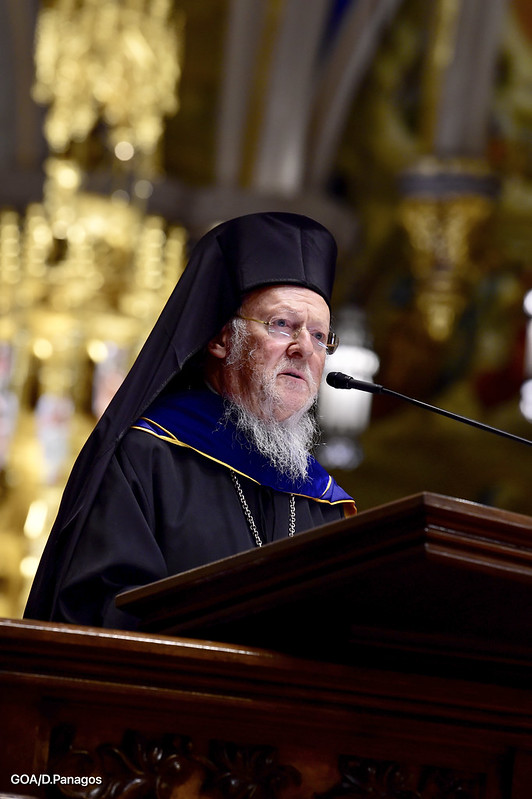
Both climate and Covid therefore present us with an unprecedented problem but at the same time an unparalleled opportunity. This is why, throughout the world, we witnessed how the pandemic revealed the best in human nature, as well as the worst in human indifference. We observed how first-responders were willing to sacrifice their lives for the sake of caring for and healing others. Yet we also noticed how some institutions and individuals stubbornly insisted on sustaining profits over people, while persistently championing their own rights over the safety of others.
This is precisely where the role of the Church becomes paramount. Because a Christian should always remember the vertical dimension alongside – and never at the expense of – the horizontal dimension of the social gospel. It is of course always difficult to maintain a delicate balance between these two dimensions, but that is the message of the Cross, which marks the tension and intersection between the earthly and the heavenly.
In this respect, it is an important but humbling lesson that the Church has learned during this time: namely, that religion must function and serve in connection with – and never in isolation from – science. Faith alone will not overcome the problems of our time; but the challenges of our time will certainly not be overcome without faith. Research and medicine are gifts from God; they supply answers to the question “how?” Faith and theology are also gifts from God; they provide responses to the question “Why?”
The ultimate struggle for Christians is how we can translate the doctrine of the Holy Trinity as communion and the teaching about the humankind created in the image of God into the daily and practical life of the world. In other words, how can the kingdom of heaven be reflected in the reality of earth? What does Liturgy look like when it is extended to the service of the world? In the seventh century, St. Maximus the Confessor spoke of a “cosmic liturgy.” This broader worldview is what enables us to imagine a world that is different to the one we have created or become accustomed to. It is the conviction that something which has not yet happened, can actually happen with the cooperation of everyone and the synergy of God. It is, as the Letter to the Hebrews, says: “the substance of things hoped for and the evidence of things not seen.” (Hebrews 11:1)
Like climate change, then, the global crisis of the novel coronavirus has presented us with ultimate questions about life and death, sickness and suffering, as well as healthcare and justice. And what we are facing cannot naively be dismissed as a temptation or a trial. It is not some kind of punishment from God or threat from government. And it is certainly not a result of “sin” or a revelation of the “end.”
In fact, our response to Covid-19 is the very arena where all Christian believers – and, indeed, all people of good will – are called to be and struggle. Otherwise, the truth is that we are not living up to our vocation as preachers of Christ crucified (1 Cor. 1:23) and disciples of our Lord who was buried and arose on the third day (1 Cor. 15:4).
Similarly, protecting the natural environment is neither a liberal nor a sentimental response. It involves constant pain and forgiveness, unrelenting preference and priority for what we truly value, for what really matters. It is the spiritual and moral response, whereby we become a healing and transformative presence among our neighbors and on our planet.
This brings us to another critical dimension of climate change and Covid-19. It is what we call the ecumenical imperative of our response. We faith leaders are called humbly and patiently to cooperate with leaders in the scientific and academic worlds, as well as the corporate and political domains. This interconnectedness reminds us that the earth unites us beyond any doctrinal, social, or cultural differences. The power of ecumenical dialogue lies in opening up beyond ourselves and our own interests, beyond our confessions or religions. It means learning to speak the language of care and compassion. And creation care brings us divided, insulated believers before a common task that we must face together.
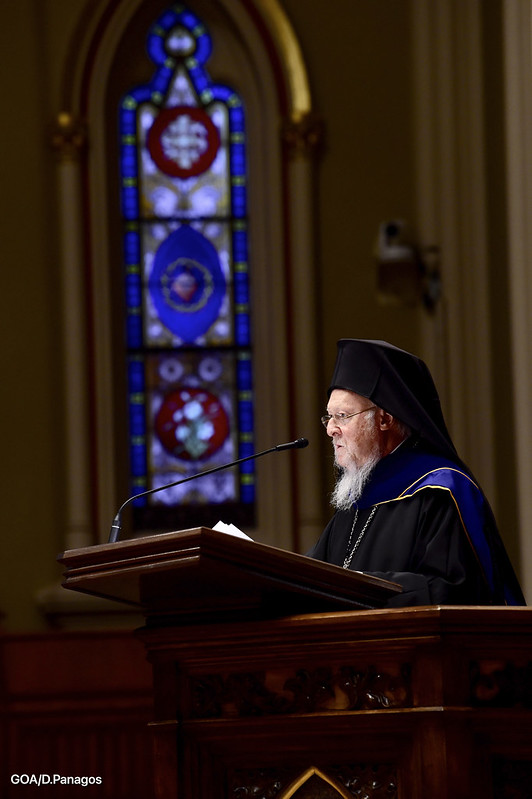
As you know, last month we issued a statement with our brothers Pope Francis of Rome and Archbishop Justin of Canterbury. It was the first time that the three of us have ever jointly signed an urgent appeal on the urgency of ecological integrity and sustainability. In our statement, “we called on everyone to listen to the cry of the earth and to the cry of people living with poverty, examining their behavior and pledging meaningful sacrifices for the sake of the earth which God has given us.”
Because we are all called to make connections between hurting people and hurting the earth. When some twenty-five years ago we defined abusing the natural environment as sin, we were pleading for people to revise their conception of what is right and what is wrong. As human beings, for instance, we surely understand that we cannot hurt our brothers and sisters, that there are consequences to our actions – moral, social, and legal consequences. Why, then, do we not grasp the fact that there should be repercussions – moral, social, and legal repercussions – when we harm God’s creation?
This is why we applaud efforts to expand relevant statutes of international law to include “ecocide” defined as the unlimited and unlawful destruction of ecosystems through oil drilling and spills, industrial fishing and livestock farming, plastic pollution and mountaintop removal, but also nuclear weapons and testing. In the same framework, we also welcome the discussion in the Latin Code of Canon Law to include a provision calling every believer not only to avoid damaging creation as our common home, but to enhance the natural environment. This certainly echoes the Orthodox worldview that considers both ecology and canon law as applied ecclesiology or spirituality in practice.
Dear friends,
It is our obligation before God, neighbor, and creation to assume responsibility for addressing climate change and suppressing the pandemic. After the historic Holy and Great Council held in Crete five years ago, in the wake of a long preparation that lasted an entire century, the Ecumenical Patriarchate appointed an official commission to draft a document on the social implications of our faith. This text, which is entitled For the Life of the World: Toward a Social Ethos of the Orthodox Church and was endorsed by our Holy and Sacred Synod, reminds us that “we are dependent creatures, creatures ever in communion, and hence we are also morally responsible not only for ourselves or for those whom we immediately influence or affect, but for the whole of the created order.” (Paragraph 76)
And on this journey, it is you – college students – that offer us the optimism that we so yearn for: The readiness to accept change and sacrifice, the capacity to overcome polarization and partisanship, the conviction to be catalysts of social and ecological justice, as well as – quite frankly – the opportunity to save democracy and our planet. May God grant your generation the necessary wisdom and courage to continue leading this charge and mandate.
